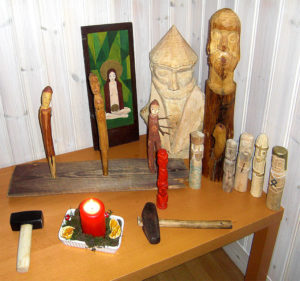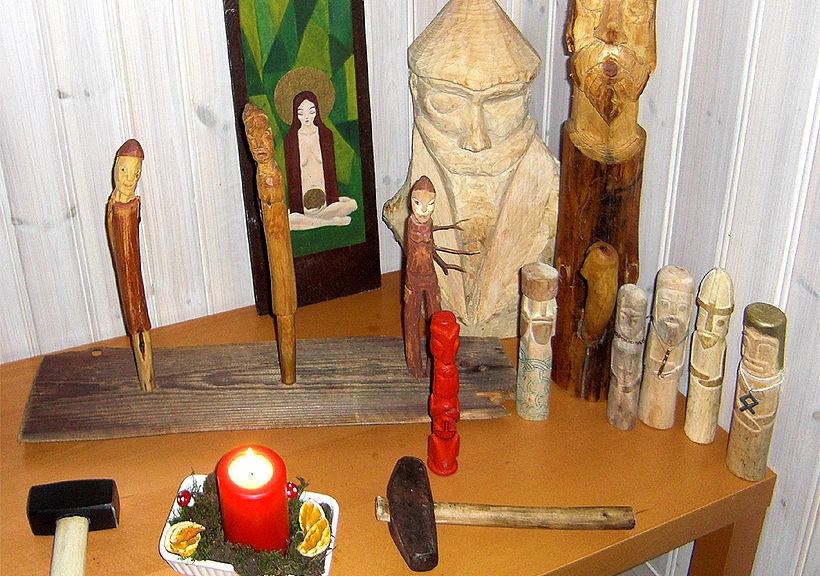Well, last week was fun, because I irked a bunch of people with my opinion on frith and troth. I suspect this week, I’ll irk a bunch of people who have laid claim to the word “heathen.” So, let me get this out in the open, once and for all:
You do not have the exclusive right to the word “heathen.” In fact, I’ll go so far as to say that you have no right to exclusively claim the word “heathen” anymore than you have the exclusive right to claim the word “pagan.”
There, now I feel better. But for those of you who were curious, I am going to go through the history and etymology of the word, “heathen.”
What Does the Word “Heathen” Mean?
I’m going to irk some folks when I trot out the Oxford English Dictionary. Under the definitions of Heathen, it says:
noun
chiefly derogatory
1 A person who does not belong to a widely held religion (especially one who is not a Christian, Jew, or Muslim) as regarded by those who do.
1.1 A follower of a polytheistic religion; a pagan.
1.2 (the heathen) Heathen people collectively, especially (in biblical use) those who did not worship the God of Israel.
1.3 informal An unenlightened person; a person regarded as lacking culture or moral principles.
Well, that says a lot. We can assume those who follow the Northern gods, such as myself, can be considered a heathen because of definition 1, and especially, 1.1 and 1.2. For those who dislike my posts and tell me to change my blog’s title, the definition in 1.3 may indeed apply to me, and therefore, I can most definitely be considered a heathen by that definition. (As an FYI, there is no definition 2.)
If you look up other dictionary definitions, you’re likely to come across synonyms: pagan, infidel, idolater, heretic, unbeliever, disbeliever, nonbeliever, atheist, agnostic, skeptic; archaicpaynim
Let’s look a little deeper into the etymology.
Etymology (not Entomology) of Heathen…OR “It’s a Bug Hunt”
Whenever I think of etymology, I always think of the movie, Aliens, because “etymology” sounds remarkably close to “entomology.” Hence, “It’s a bug hunt.” Seeing as it is not, I’ve gone over to Dictionary.com and pulled up “paynim,” which is the root of “heathen.”
It says:
Origin of paynim:
200-50; Middle English: pagan (noun and adj.), pagan countries, heathendom < Old French pai (e) nime < Late Latin pāgānismus paganism
“But Tyra,” you say, “that isn’t where heathen comes from.” I kind of agree with you on that. The Oxford English dictionary cites:
Origin
Old English hǣthen, of Germanic origin; related to Dutch heiden and German Heide; generally regarded as a specifically Christian use of a Germanic adjective meaning ‘inhabiting open country’, from the base of heath.
Okay, so now we’re somewhere. And we can agree that it comes from Anglo-Saxon, which means “inhabiting open country.”
The Definition of Heathen
A heathen, by definition is either a pagan who does not worship the Abrahamic religions (or a major religion) or a person who inhabits open country. Wow! Isn’t that simple? There isn’t a single mention of Odin, frith, troth, or reconstruction anywhere in those definitions! (One might assume that if you follow Odin and the Aesir, you are most definitely a heathen.) It isn’t a particularly discriminating term, either, when it comes to the pagan gods.
The word, “heathen” seems to be all encompassing when it comes to pagans. And guess what? By the agreed upon dictionary definition, heathen encompasses Wiccans, pagans, and other folk who do not follow the Northern gods. It does, by definition, encompass those who worship Jotun, Loki, Native American gods, African gods, Shinto, Hindu, Asian polytheistic religions, Atheists, and even some people who worship snakes in their bathtub. You might argue that the bigger world religions such as Hindu, Buddhism, Taoism, Shinto, and other religions that have huge followings are not heathen, and you might be right, but only because they are widely held religions. I might argue with you that they are part of the “heathen” group because they are not of the Abrahamic religions.
 The Definition of Asatru
The Definition of Asatru
So, if “heathen” is not a definitive term for someone who follows the northern pantheons, what is
Asatru? Well, Asatru is really a religion, and is defined by the Oxford dictionary as:
noun
The pagan polytheistic religion of early Scandinavians ( historical ). Now also: a neopagan religion based on this.
Origin
1920s. From Icelandic ásatrú from Old Icelandic ása, genitive plural of áss god + trú belief, perhaps after Norwegian asatro early Scandinavian pagan religion.
So, What Does All This Mean?
“Heathen” is such a general term that it’s hard to pin it down to one particular group or custom. I tend to use the term “heathen” to mean anyone who follows or worships gods in the northern pantheon. I don’t get my panties in a wad if someone uses it differently than I do. I expect there are going to be different usages of the word.
 That being said, I will include you in the term “heathen” if you follow the northern pantheon and aren’t a racist or Nazi sympathizer. Hel, I’ll even accept the recons in that definition. You don’t need a secret handshake, a Mjolnir necklace, a drinking horn, or horns on your helmet (in fact, horns on your helmet will get you tossed out — fair warning!) And that, my friends, is what a heathen is.
That being said, I will include you in the term “heathen” if you follow the northern pantheon and aren’t a racist or Nazi sympathizer. Hel, I’ll even accept the recons in that definition. You don’t need a secret handshake, a Mjolnir necklace, a drinking horn, or horns on your helmet (in fact, horns on your helmet will get you tossed out — fair warning!) And that, my friends, is what a heathen is.
 Now that I’ve talked about five reasons for not becoming Heathen, the flip side is what are good reasons for becoming a Heathen. Naturally, there are people who may disagree with me, but I think there are good reasons for becoming a Heathen. Let’s get started… [READ THIS AND ALL PREMIUM POSTS FOR JUST $1. SUBSCRIBE NOW!]
Now that I’ve talked about five reasons for not becoming Heathen, the flip side is what are good reasons for becoming a Heathen. Naturally, there are people who may disagree with me, but I think there are good reasons for becoming a Heathen. Let’s get started… [READ THIS AND ALL PREMIUM POSTS FOR JUST $1. SUBSCRIBE NOW!]


















